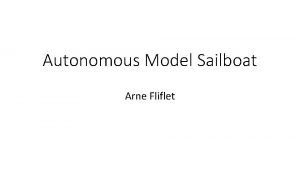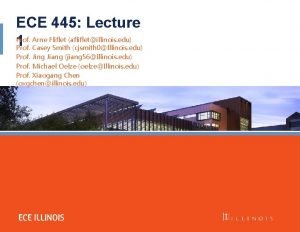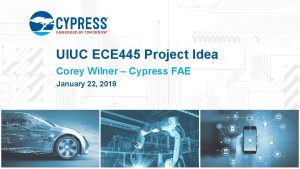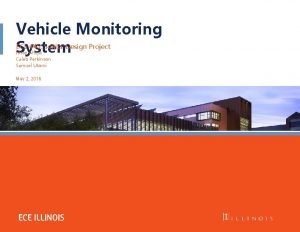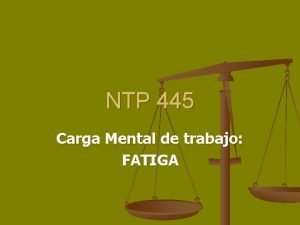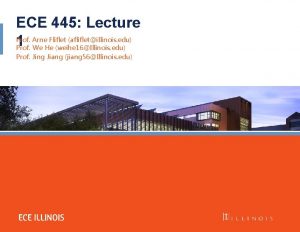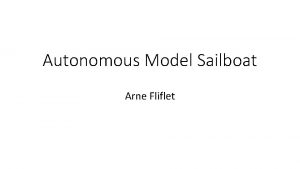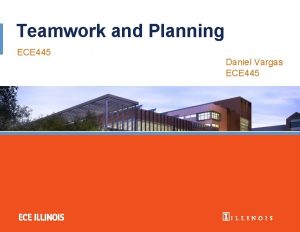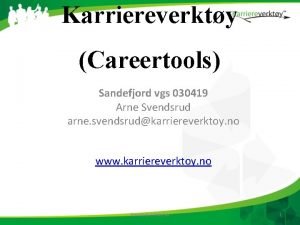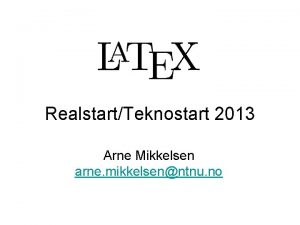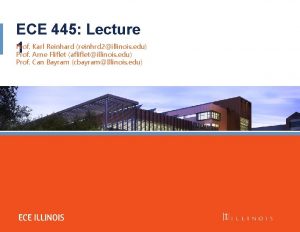ECE 445 Lecture Prof Arne Fliflet aflifletillinois edu













- Slides: 13

ECE 445: Lecture Prof. Arne Fliflet (afliflet@illinois. edu) 1 Prof. Jing Jiang (jiang 56@Illinois. edu) Prof. Joohyung Kim (joohyung@Illinois. edu) Prof. Rakesh Kumar (rakeshk@Illinois. edu) Prof. Jonathon Schuh (schuh 4@Illinois. edu)

Course Introduction § Welcome to ECE 445, the department’s capstone course § During these initial lectures we will give you the tools you need for the course and listen to project pitches § We expect you to propose projects that are unique, technically challenging, and useful for solving a real-world problem § You will use the course design process to design, build, test, and demonstrate a novel device § ECE 445 draws on the entire ECE undergraduate experience – Our expectations for you are high – Students frequently produce impressive results –

Course Overview § Project Identification (weeks 1 -3) – Students propose project ideas on the course web board and form teams of 2 or 3. – Students and staff critique ideas on web board and proposers respond – When an idea seems ready, it becomes the basis of an RFA (Request for Approval) – RFA’s may be further critiqued and then are either approved or rejected – Approved RFAs become projects and assigned to a TA and an instructor § Project Design (weeks 4 -6) – Teams with approved projects meet with TA and begin working on Design Document – The design document is an instruction manual for your project – It describes the goals of the project that you intend to achieve § Project fabrication, testing and analysis (weeks 7 -14) – Part procurement, breadboard testing, microprocessor programming

Project Request for Approval (RFA) § All projects start on the Web Board – Each idea must first be presented on the web board – Professors, TA’s, and other students critique and discuss each idea – The first student to pitch an idea is the owner of that idea – After sufficient discussion, an idea can become an RFA § Projects must meet our criteria for uniqueness, complexity, and scope – Projects must address a new problem or be a new approach – Design complexity involves the project function, circuitry, microprocessor type, and software – Scope must be consistent with course time constraints – Projects must have a two or three person team

Design § The sooner your project is approved, the sooner you can begin the design process § The process begins with the Project Proposal – Objective and Background – High-level requirements – Description of design - block diagram, component requirements – Ethics and safety § The Design Document is an instruction manual for your project – Includes design equations, circuit schematics, physical design, flowcharts, test procedures, and component requirements – Another ECE student not familiar with your project should be able to follow this document and make a

Building and Testing § The middle 8 weeks are devoted to building and testing your project device § Work in accordance with the schedule laid out in your DR along with guidance from TA’s and Professors – Identify problems early, make adjustments – Get your PCB order in early – Make early contact with machine shop but keep mechanical design simple § Eagle and Soldering assignments help with understanding PCB design and installation

Demonstration and Beyond § Week 15: Demonstrate a fully functioning prototype to your Professor, some TA’s, and other students – This should be the highlight of your course experience – 150 of the 510 course points can be earned here § Week 16: Give formal presentations on your project and submit Final Report § Beyond: Some of you will continue developing and improving your project to create a real-world product § Students own IP of student-originated

How to succeed in ECE 445 § Get familiar with the course web site and watch the videos – RFA, project proposal, lab notebook, modular design, ethics, . . . § Use course calendar to anticipate deadlines § Understand the grading process – 21 grades large and small – Design Review, lab book, demo, final presentation, report – Eagle and soldering assignments – Team evaluation, individual progress report, peer review § Key task now is to get a project approved § Participate in web board discussions § Can’t find a project?

How to succeed in ECE 445, continued § Work with your teammates to build a strong team § Hold regular meetings § Communicate with your teammates and TA § Discuss problems as soon as they arise § Spend time documenting your work in your lab book § Get help solving problems - a lot of expertise is available § Keep the project moving during the build phase


Staff and Support Structure § Five instructors and twelve TAs § Each project will have one TA mentor and one professor § Project teams meet weekly with their TA – the TA is the primary guide and point of contact § Instructors – Professors Arne Fliflet, Jing Jiang, Joohyung Kim, Rakesh Kumar, Jonathon Schuh § TAs – Ruomu Hao, Madison Hedlund, Jonathan Hoff, Stephanie Jaster, Dhruv Mathur, Shaoyu Meng, David Null (head TA), Vassily Petrov, Megan Roller, Charles Ross, Evan Widloski, and Chi Zhang § Course Directors – Professors Kumar and Oelze


Closing Remarks § This has been a quick overview – a lot more information is coming § This course is like an express train that is now leaving the station § Expect to work hard § Course grading includes many assignments with deadlines – always pay attention to the course calendar § Each project includes some risk § Expect to encounter obstacles § Don’t be afraid to seek help § Questions?
